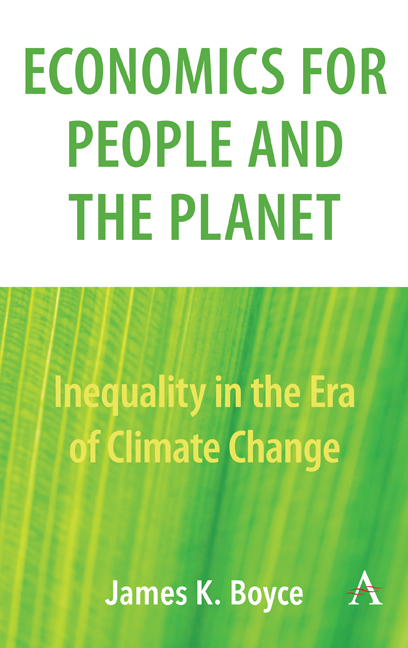Book contents
- Frontmatter
- Contents
- List of Illustrations
- Acknowledgements
- Part I Rethinking Economics and the Environment
- Chapter 1 Limits to Growth–of What?
- Chapter 2 The Twin Tragedies of Open Access
- Chapter 3 Pursuing Profits–or Power?
- Chapter 4 Rent in a Warming World
- Chapter 5 Universal Assets for Universal Income
- Chapter 6 Universal Basic Income: Six Questions
- Chapter 7 Environmentalism's Original Sin
- Chapter 8 Rethinking Extinction
- Part II Environmental Injustice
- Part III Climate Policy
- Notes
- Publication History
- Index
Chapter 6 - Universal Basic Income: Six Questions
from Part I - Rethinking Economics and the Environment
Published online by Cambridge University Press: 12 February 2019
- Frontmatter
- Contents
- List of Illustrations
- Acknowledgements
- Part I Rethinking Economics and the Environment
- Chapter 1 Limits to Growth–of What?
- Chapter 2 The Twin Tragedies of Open Access
- Chapter 3 Pursuing Profits–or Power?
- Chapter 4 Rent in a Warming World
- Chapter 5 Universal Assets for Universal Income
- Chapter 6 Universal Basic Income: Six Questions
- Chapter 7 Environmentalism's Original Sin
- Chapter 8 Rethinking Extinction
- Part II Environmental Injustice
- Part III Climate Policy
- Notes
- Publication History
- Index
Summary
Basic questions on universal basic income: an interview with Vita International.
A basic income would not be cheap–depending on how the programme was structured. But how feasible is universal basic income (UBI) to implement in reality?
Funding for UBI is the main obstacle to implementing it. One way to do so would be to charge for use of common wealth (such as the limited ability of the environment to safely absorb pollution) and to return the revenue to the people. In this case, UBI would come from assets whose ownership is universal, too.
But what about the worry that a universal basic income would stop people from working? How would UBI affect labour supply?
It is unlikely that UBI would be large enough to deter people from working. It would, however, give them greater freedom to choose work they want to do, including work that doesn't pay as much but has richer non-monetary rewards.
Another major question is whether UBI is designed to supplement or substitute for currently existing welfare programmes. What do you believe?
UBI could either supplement or substitute for current welfare programmes. Most likely it would do some of both.
A recent study estimates that 47 per cent of US jobs potentially will be replaced by robots and automated technology in the next 10 to 20 years. Is universal basic income an answer to automation?
Automation is one of many factors that contribute to unemployment and underemployment. By providing an additional source of income, UBI would help to provide a cushion against the various factors that erode income from labour.
Low-paid, part-time, temporary and seasonal workers would get a big boost to their incomes. Many people might use the payment to invest time and money in education or training. Many experts argue that universal basic income would help to fight poverty and inequalities.
There is no panacea to the problems of poverty and inequality, but UBI would be a step in the right direction.
Some say entrepreneurship would become less risky. How?
Much as UBI would provide a cushion against unemployment and underemployment, it would cushion would-be entrepreneurs against risk of low incomes. This might make it easier to start small businesses.
- Type
- Chapter
- Information
- Economics for People and the PlanetInequality in the Era of Climate Change, pp. 21 - 22Publisher: Anthem PressPrint publication year: 2019



